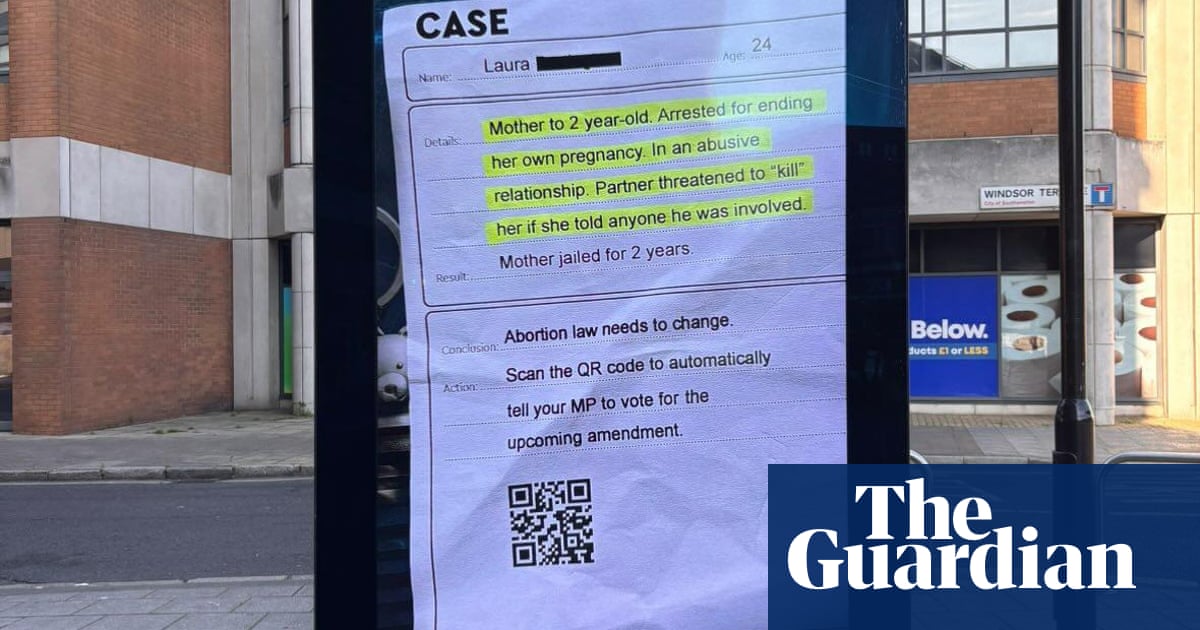Transport for London has blocked adverts that urge people to lobby their MPs to vote to decriminalise abortion from running on its network because it claims they could bring the police and City Hall into disrepute.
Parliament is expected tovote on whether to decriminalise abortionin England and Wales in the coming weeks, with amendments tabled to the criminal justice bill seeking to change the law.
The adverts from the British Pregnancy Advisory Service (Bpas) charity, which have been approved by theAdvertising Standards Authority, have appeared on display boards across England and Wales. They feature anonymised case studies of women who have been investigated by police, and in some cases prosecuted, after terminations or pregnancy loss.
“The language is not inflammatory, derogatory or hateful,” Bpas said in a letter toTfL, seen by the Guardian. “It is an accurate representation of real women’s experiences. It is intentionally simple, to the point, with a clear democratic call to action.”
In 2024, campaign material from Dignity in Dying was displayed on the TfL network, including in Westminster tube station. In the same year, it allowed pro-choice campaign material on buses across London, sponsored by Doctors for Choice andAbortionTalk, which featured the slogan “abortion is healthcare, not a crime”.
At the time, a TfL spokesperson said: “We reviewed this advertising campaign against both our advertising policy and the Committee ofAdvertisingPractice (CAP) code, and it was found to be compliant.”
Bpas said it had requested “an immediate in-depth explanation of the decision to reject our material” from the transport body.
In a response from TfL, also seen by the Guardian, Chris Reader, the organisation’s head of commercial media, told the charity: “The reason for the rejection is that the proposed advertisement makes serious allegations about the police.
“The Mayor’s Office for Policing and Crime (Mopac) is a member of the GLA group and one of its functions is to hold the Metropolitan police service (MPS) commissioner to account for the police service inLondon.”
He added that “because Mopac’s functions in respect of the MPS are to some extent regulatory”, the “nature of the copy could bring Mopac into disrepute, given its responsibilities in relation to the MPS”.
Bpas’s chief executive, Heidi Stewart, said the charity intended to appeal against the decision by the transport body. “At a pivotal moment for abortion law reform in this country, TfL regulations have silenced the voices of women who have been left utterly traumatised by our archaic legislation and by those enforcing it,” Stewart said.
“This cannot be allowed to happen again.Womendeserve to have their stories told – and the public has a right to hear them. We will be challenging this decision at the highest levels.”
Tonia Antoniazzi, one of the Labour MPs putting forward an amendment aiming to change the law, said she was “stunned” by the decision to ban the adverts from the network, adding it was an attempt to “silence desperate women’s voices and dodge accountability”.
Sign up toFirst Edition
Our morning email breaks down the key stories of the day, telling you what’s happening and why it matters
after newsletter promotion
She added: “In the last month, we’ve heard how police forced through the prosecution of a woman for abortion offences, have issued guidance telling police to search the homes of women who’ve had stillbirths, and that decisions about enforcement on abortion are made at the highest levels of the Met.
“It’s not hard to see why they wouldn’t want the public to know. It’s not these women’s stories that bring the police into disrepute – it’s their own actions.”
Antoniazzi’s amendment, which would remove women from the criminal law related to abortion in England and Wales, is backed by charities, trade unions, and medical colleges, including the Royal College of Obstetricians and Gynaecologists as well as Bpas.
“The police cannot be trusted with abortion law – nor can the CPS or the wider criminal justice system,” she said. “My amendment NC1 to the crime and policing bill will give us the urgent change we need to protect women.”
A separate amendment, put forward by another Labour backbencher, Stella Creasy, seeks to decriminalise abortion, as well as write into law a human right to access abortion.
A TfL spokesperson said: “The proposed advertisement did not comply with TfL advertising policy because it made negative references about the police.”
